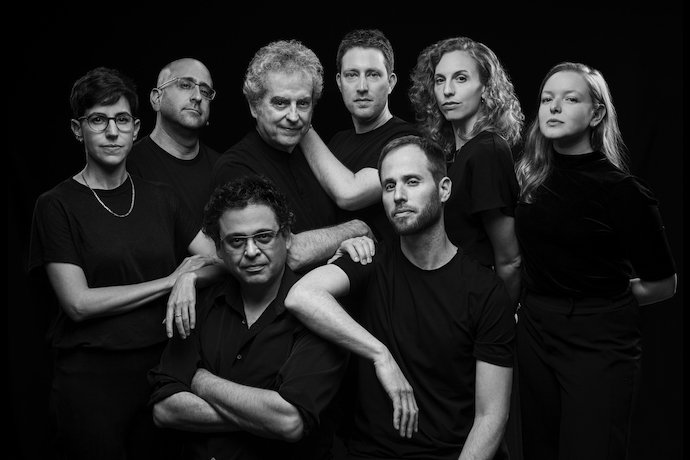
By Ethan Borshansky
Studio Annette
Tel Aviv
Israeli contemporary music is more robust, diverse, and brimming with passion than ever, as demonstrated by the season opener of Meitar Ensemble at Studio Annette in Tel Aviv on Saturday night. Under a hot pink ceiling of the elegant new concert space in the pulsating Florentin district, a packed audience awaited no fewer than six world premieres. The programme consisted of a wide cross-section of Israeli contemporary music, all of which was performed with ease, candour, and dedication under the illustrious French conductor-in-residence Pierre-André Valade.
Wind turned out to be a recurring theme, beginning with Eli Korman’s Ruach (wind or spirit in Hebrew), performed by a youth flute choir assembled from the Nazareth-based Polyphony Conservatory. The rapport between young Arab and Jewish musicians in this performance provided a testament to just one of the avenues through which the Meitar Ensemble incubates and advocates for peace and social benefit (see more about their affiliations and initiatives on their website: Meitar.net). Ruach opened the evening with a continuous, fluid form, swelling towards tangy pitch density and then back to quietude. One large, collective inhale and exhale.
Waking up the Dead Sea by Naama Perel contributed a cool-hued, contemplative multimedia work with ecological overtones. Images of extraterrestrial-looking landscapes shifted slowly on a large projection screen as the ensemble spun ethereal textures interspersed with bursts of angst. The blustery Etude III by Jörg Widmann continued the atmospherium with a solo violin showpiece built on lightning-speed, gossamer arpeggios. Violinist Talia Herzlich handled the extreme register changes with beguiling grace, making virtuosity recede and soulfulness come to the fore.
By now, the common thread of wind, breath, air, or vocality, had become noticeable throughout the various works, though none of this was premeditated. Everything had a kind of spacious, respiratory quality, a gentle but intense gravitas. There was a sense that these composers had much to process in the past months but little idea of how to put anything into words – there was no vocal music to be found in the program.
Eitan Steinberg’s Motet turned the mood inward again, taking the traditionally sacred Renaissance form to a realm of ineffable emotion. The entirely instrumental composition was like an artisanal mobile, sustaining both the vertical and horizontal with musical ergodicity, as if to capture suspense and resilience all at once. The reference to wind emerged once again in Amit Buium’s piece, this time through audio samples enriching a full-bodied acoustic palette. All the musicians gradually coalesced into a collective didgeridoo sonority, highlighting reedy multi-phonics on the bassoon.
The French philosopher and composer Hugues Dufourt capped the evening with a challenging exploration of timbre scored for Pierrot ensemble minus voice. Novel extended techniques and endless metric complexity made for a vivacious, demanding work. The title referenced Rembrandt’s The Three Trees, encouraging a visual-musical interpretation of the art subject, a stark, tempestuous landscape. Dufourt is most often clumped with Jean-Claude Risset and Tristan Murail of the French spectral school (a term Dufourt coined himself in 1979). Although the august octogenarian was not able to make it to the premiere, his contribution to the concert amounted to a strong statement of support for Israeli contemporary music at a time of increasingly arbitrary and dubious cancellations of Israeli musicians.
Now in its twenty-first season, the Meitar Ensemble is proving itself to be instrumental in keeping Israeli contemporary music vibrant, accessible, and engaged in social activism. The artistic manager, Amit Dolberg, exudes impressive optimism and conviction about the future, and for good reason. The Meitar Ensemble’s collaboration with the Felicja Blumental Music Centre has enabled their current residency at Studio Annette and established themselves as a durable institution of the contemporary music world. The ensemble has now commissioned over 400 new works, including from Iranian composers and other unlikely allies (as Dolberg was careful to emphasize in a pre-concert conversation). Saturday’s concert signalled a superb season to come from one of Israel’s most forward-thinking ensembles. ![]()